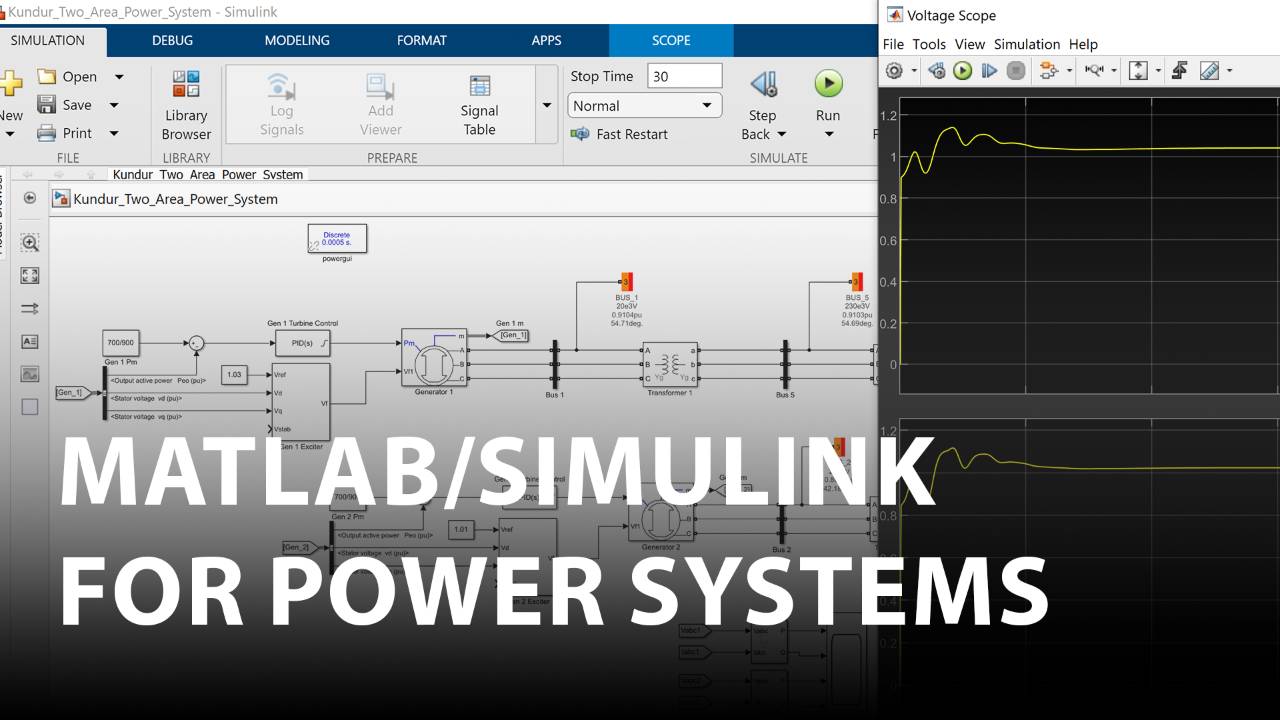MATLAB/Simulink for Power System Simulations
3 sections | 21 lectures | 4hr 40min
Learn how to model generators, transformers, transmission lines, loads, capacitors banks, and control systems, as well as how to run load flow and short circuit studies in MATLAB/Simulink with our Power System Simulations online course. Professional engineers can earn 4 PDHs by completing this course.
Enroll Now
Course Description
This course is designed to allow you to simulate power systems in MATLAB/Simulink. This course not only gives a review of the theory of how power systems operate, but also gives several examples on how to run different types of power system studies using MATLAB/Simulink. The course is divided into the following sections:
Course Introduction:
We will begin in section 1 by giving an introduction to the course, introducing the instructor, and defining the course objectives.
Introduction to MATLAB/Simulink for Power Systems:
In section 2 of the course, we will begin by reviewing the libraries available in Simulink to represent generators, transformers, transmission lines, and loads in our models. After that, we will take a look at how we can model these components in Simulink, as well as how we can put them together in a model and how we can take measurements in the model to ensure proper simulation.
Power System Studies in MATLAB/Simulink:
After we've made ourselves familiar with the MATLAB/Simulink environment building a small power system model, we will move on to build a large power system model in section 3, which includes several generators, transformers, transmission lines, loads, and capacitor banks. We will also model the turbine control systems and excitation control systems for all generators to simulate the realistic dynamic behavior of power systems in real life. After we have built the entire model, we will run several types of studies, including load flow, short circuit, and stability studies, to simulate the behavior of the system under several conditions. This will give us all the tools we need to build any type of power system and run any power system study using MATLAB/Simulink.
As mentioned above, in each section, we will go over several models to illustrate how we can design and simulate power systems in MATLAB/Simulink. The models are also available for download so that you can follow along, as well as use these models and modify them to create your own power system models.
By learning how to simulate power systems in MATLAB/Simulink, you will be able to further your career in electrical engineering and power engineering.
See you in the course!
What You'll Learn
Enroll Now
Preview Lectures
Check out the three lectures below from this course!
Pricing Options
Choose from three pricing options: monthly subscription, annual subscription, or one-time lifetime purchase of this course only. All subscriptions include every course, future releases, and access to the Romero Engineering Co. Web App with its suite of professional tools. Every option is backed by a 30-day, 100% money-back guarantee.
Course Outline
Not sure if this course covers what you want to learn? Download the full course outline to find out more.
Download OutlineCourse Instructor
Ricardo Romero, PE is an Electrical Engineer with over twelve years of experience in Power Systems, having worked as a Power Systems Protection Engineer at Schweitzer Engineering Laboratories, Inc. (SEL) and Power Relaying Solutions, PLLC (PRS). He started his own power engineering consulting and online learning business in 2020 – the Romero Engineering Company. He obtained his bachelor’s and master’s degrees in Electrical Engineering from The University of North Carolina at Charlotte, where he specialized in Power Systems, Power Electronics, and Power System Protection and Control. He is a licensed Professional Engineer in Power Systems in the states of North Carolina, Pennsylvania, South Carolina, and Virginia.
Book a Call
Frequently Asked Questions
How many PDHs does this course offer?
How many lectures are included in the course?
What does my subscription give me?
Who is this course for?
Start Learning Today
If you're ready to start learning about power system simulations, let's get started.
Learn About Power Engineering
Stay informed about new online courses, upcoming webinars, and promotions by signing up to our email list.

